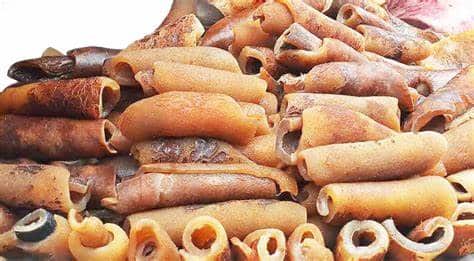The Federal Government has raised alarm over the rising consumption of hides and skins, popularly known as ponmo, warning that the trend poses a major threat to Nigeria’s leather industry, currently estimated at about $5 billion.
The caution was issued during the National Campaign Against the Consumption of Ponmo held on Thursday, November 13, 2025, in Abuja.

Ponmo consumption threatens leather industry
Speaking at the event, the Director-General of the Raw Materials Research and Development Council, Prof. Nnanyelugo Ikemounso, said eating hides deprives local manufacturers of essential raw materials needed to sustain the country’s leather production and export capacity. He noted that the local industry heavily depends on hides and skins as core inputs.
Ikemounso revealed that Nigeria’s leather goods market was valued at $2.79 billion in 2024 and is projected to expand to $4.96 billion by 2033. He warned that diverting hides to food consumption could hinder this growth trajectory and undermine national economic gains.
He said …
“From an economic and industrial standpoint, cowhides are one of Nigeria’s most valuable raw materials. Our nation possesses a vibrant leather industry with enormous potential for job creation, foreign exchange earnings, and contributions to GDP
“As of 2024, the Nigerian Leather Goods Market was valued at USD 2.79 billion, with a forecast to grow to USD 4.96 billion by 2033.
“Sadly, the continuous diversion of hides for ponmo consumption denies our industries access to quality raw materials, weakens our tanning and leather manufacturing sector, and diminishes Nigeria’s competitiveness in the global leather market.”
The DG further highlighted that the global leather value chain is estimated to be worth between $420 billion and $1 trillion, adding that Nigeria has the potential to significantly increase its share with the right policies, infrastructure, and consistent supply of raw materials. He stressed that safeguarding hides for industrial use is critical to securing Nigeria’s participation in the international market.
Ikemounso clarified that the campaign is not aimed at dismissing cultural or dietary preferences but at promoting the productive use of hides and skins for national development. He urged Nigerians to support efforts to strengthen the leather sector, which he described as one of the country’s most promising non-oil industries.
“It is important to clarify that this campaign is not against tradition or personal food preference,” Ikemounso said.
“Rather, it is a strategic intervention to prioritise the industrial use of hides and skins, particularly for leather production, which holds immense potential for economic growth, job creation, and export diversification.”
Ikemounso also highlighted health and nutritional concerns associated with the consumption of ponmo, noting that the delicacy offers little to no dietary value. He explained that hides are largely composed of collagen with insignificant amounts of protein or essential micronutrients, making them an unreliable source of nourishment.
He further warned that many of the hides sold for consumption are processed with dangerous substances, including formalin, diesel, and other non-food-grade chemicals. According to him, these toxic agents pose severe health risks, ranging from organ damage to increased susceptibility to cancer.
The DG urged Nigerians to prioritise their health and consider the long-term consequences of consuming chemically treated hides, stressing that both the nation’s wellbeing and its economic prospects depend on redirecting hides and skins into productive industrial use.
“From a nutritional perspective, ponmo offers very little value. More worrisome, in many cases, hides used for ponmo are subjected to preservation and processing methods involving harmful substances such as formalin and diesel.
“These pose serious health risks ranging from organ damage to increased risk of cancer,” he added.

